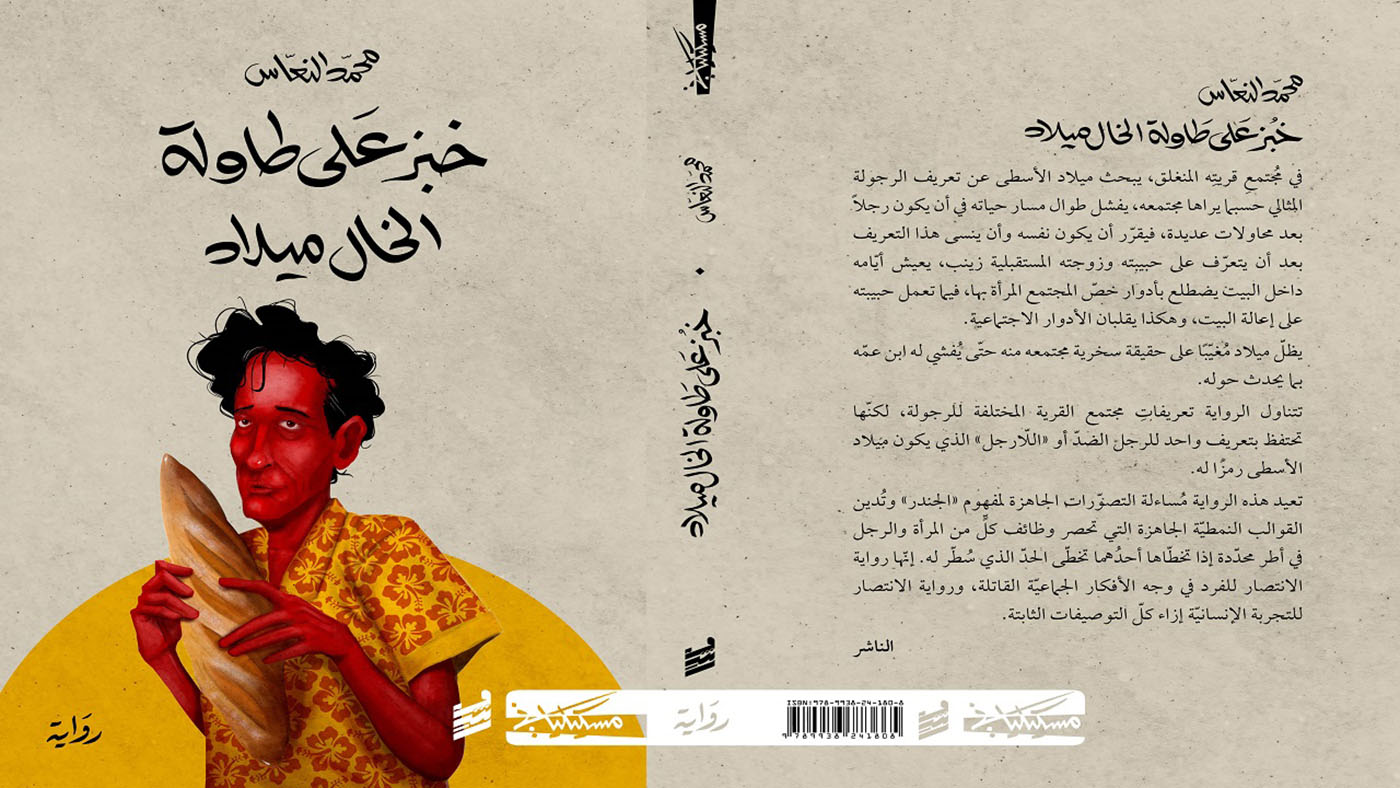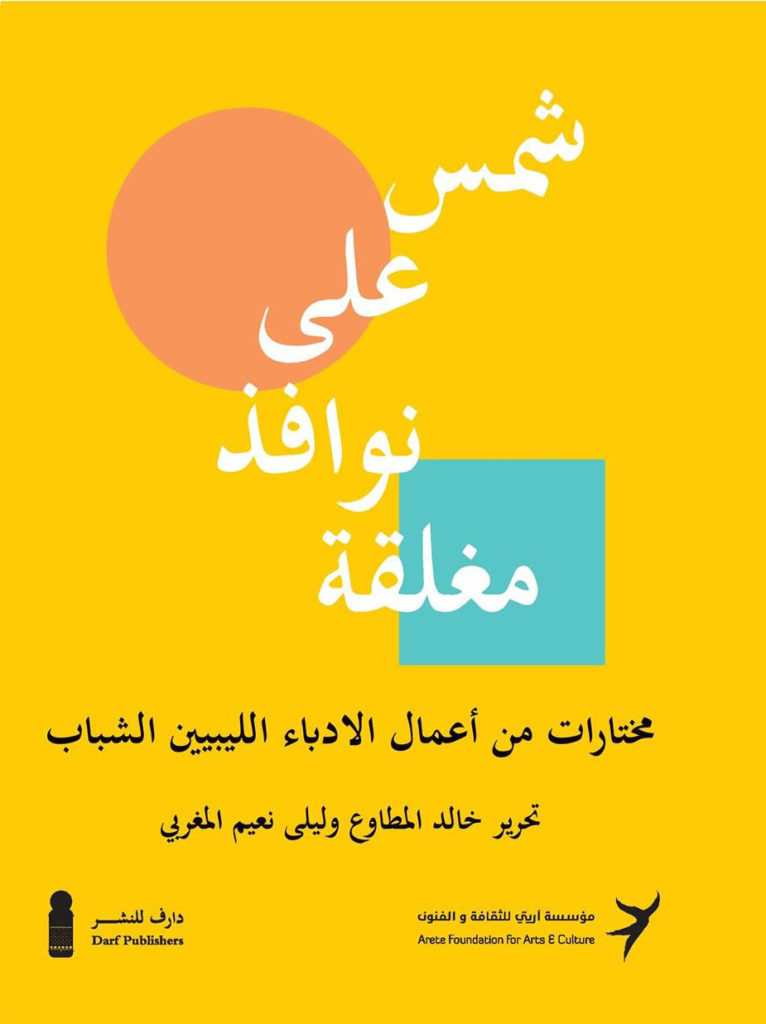
Ghazi Gheblawi
In 2017, Darf Publishers, a London-based independent publishing company where I am a senior editor, published an anthology of writers from Libya under the age of 30. The project was the brainchild of Libyan American poet Khaled Mattawa, through his nonprofit, The Arete Foundation for Arts in Culture. Launched in 2011 and funded within a few years, the Arete Foundation has organized and supported a number of cultural events and projects in Libya following the political upheaval of 2011. The anthology, titled A Sun Shining on Shuttered Windows (Shams ‘ala Nawafidh Mughlaqah), included 24 authors, many of whom began writing during the thawra, and shone a light on new writing by a wave of Libyan writers who were breaking the norms of society and culture. Pejoratively dubbed “The Yellow Book” by its detractors for the color of its cover, A Sun was later banned in Libya, and its writers faced abuse and harassment on social and mainstream media, which caused a number of them to leave the country or go into hiding until the smear campaign died down.

Mohammed al-Naas, winner of this year’s prestigious International Prize for Arabic Fiction (IPAF) for his debut novel, Bread on Uncle Milad’s Table, was among the writers featured in the anthology. His novel heralded the birth of a fully formed writer who had honed his skills for more than a decade, writing short stories, unpublished novels, and, most importantly, captivating articles of nonfiction and investigative journalism that explored the social aspects of life in Libya before and after the fall of the Gaddafi regime.
At the age of 31, Naas (born in 1991) is among the youngest writers to win the renowned prize, which since its inception in 2008 has become the most influential literary accolade in the Arab world, often accompanied by speculation, intrigue, and a fair share of the drama that haunts similar literary prizes worldwide.
Naas represents the post-2011 generation of Libyan writers, each of whom began to find his or her voice during the dramatic political events that set Libya on a course to many social and cultural turning changes, but also ushered in a decade of instability, war, and chaos. In this upheaval, writers found themselves less burdened with a political system that was overreaching, controlling, and repressive of individual freedom of expression, even though these repressive functions became the preserve of myriad local centers of authority and power, with many fielding rogue militant armed groups. Indeed, while the past decade has witnessed a flourishing of creativity in the fields of journalism, media, literature, and the arts, it has also seen repression and violence.
As he was exploring ideas related to his first novel, Naas embarked on a sociological, cultural, and historical excavation of the Libyan psyche and personality through a series of poignant essays and investigative articles that were published on his blog (Out of Reach) as well as several influential online Arabic-language platforms. These articles dealt with culture in Libya, from folk music, sayings, and dance to a critique of the Libyan mind. His articles were well-researched and written with the eye of a documentarian, even as they maintained a keen sense of humor.
This social and cultural dissection prepared Naas to delve into topics and ideas that were rarely mentioned outside casual social gatherings and local cafes. It was his ability to dig deep into the meaning of cultural attitudes that allowed him to lay bare some of the most sensitive issues facing Libyans, while maintaining the style of a storyteller with condensed sentences.
His first attempt at a novel, Ensan (Human), which he wrote in 2013, was an examination of the history of violence in Libya through the eyes of a Gaddafi loyalist soldier during the 2011 conflict. It was posted online, but Naas never managed to finalize a manuscript for publication. He recently confessed that he can’t go back to it anymore. He continued publishing short stories, and in 2015 won the Khalifa Fakhri Award for Libyan Short Stories, which recognized his skills as a storyteller.

That same year, he resigned from his day job as an engineer to become a full-time writer and journalist, working as the editor of Huna Libya, an online platform on Libyan current affairs supported by the Dutch public broadcaster Radio Netherlands Worldwide. In 2017, he was forced to spend several months in Tunisia after a public backlash against the aforementioned anthology of young Libyan writers, which was subsequently banned in Libya. Several writers were harassed and driven into hiding, threatened by rogue militant elements in the country, leading one editor of the collection to seek asylum in Europe.
Naas has emphasized on many occasions that he began writing drafts of several novels before managing to complete Bread on Uncle Milad’s Table (published by Rashm and Meskliani in 2021) in six months during Covid-19 lockdowns in 2020. The journey began a decade ago when, like many emerging writers, he wrote short stories, an essential feature of the Libyan literary scene across the past seven decades. In 2019, he edited and self-published his first collection of short stories, Blue Blood, which dealt with the social and cultural challenges facing a generation of Libyans coming of age after the 2011 uprising.
Libyan Stories from Bread on Uncle Milad’s Table
It was Naas’s fascination with the Libyan psyche, manifested in traditional sayings and local folk trends and attitudes, that led him to begin writing Bread on Uncle Milad’s Table. Gender roles, masculinity, and social changes in Libya became the main issues to which he turned his attention. The novel hinges on a Libyan phrase of recent vintage, “a family whose uncle is Milad.” Naas explains the origins of his fascination with the image of the “man,” manhood, and masculinity in the Libyan mind in an article he published just before the publication of the novel in 2021.
He admits that he failed to find any evidence of the phrase’s use before 2011, as internet services were not widespread enough in the country for it to appear on any Google search result. He also unsuccessfully attempted to uncover traces of the phrase in reference books on popular proverbs that he managed to find, the kind that details the relationship between a man and a woman. He explains that the phrase claims that the root cause of women’s liberation is not the absence of male authority, rather that such authority encourages women’s liberation, which is considered “debauchery” in the eyes of society.
Naas adds that “Uncle Milad is a danger to the identity and image of the man” — he is the man “who cooks for the woman in his life, dances with her, sings with her, irons her clothes, washes dishes, listens to her, and cries over her wounds and pain.” Naas points out that this sort of man reveals his feminine side, and that he “encourages his woman to be liberated from society’s authority.” He concludes that “Uncle Milad is a disgraced man. The anti-man, a threatening image,” an image that Libyans agree shouldn’t represent the Libyan man.
Milad in the novel is a conflicted character who is shaped on the one hand by society’s expectations and on the other by his conviction that he has to break these societal norms and traditions. Naas researched his character to the extent that he delved into the world of bread-baking and pastry-making, which Milad takes up as a profession. He managed to use all his knowledge and skills to hold a mirror up to society and make it see its reflection. And as is often the case with expository writing, people didn’t like what they saw.
Shukri Mabkhout, Chair of Judges for the 2022 IPAF, described Naas’s novel as written “in the form of confessions of personal experience. Its plethora of details is deftly unified by a gripping narrative, which offers a deep and meticulous critique of prevailing conceptions of masculinity and femininity and the division of work between men and women, and the effect of these on both a psychological and social level. It falls into the category of novels which question cultural norms about gender; however, it is embedded in its local Arab context, and steers away from trivial projections or an ideological treatment of the issues, which would be contrary to the relativism of fiction and its ability to present multiple points of view.”
Following the announcement that Bread on Uncle Milad’s Table had won the IPAF, and after a short-lived wave of praise and congratulatory messages from the Libyan government and public, Mohammed al-Naas found himself at the center of a smear campaign by self-appointed custodians of “morality, traditions and norms,” who condemned the book’s “explicit” passages and use of “indecent” phrases. Shortly thereafter, the Libyan Ministry of Culture deleted its congratulatory note from its Facebook page and issued a statement banning the sale and distribution of the novel in Libya until it acquired the “proper permission” from official bodies.
These days, Naas is working from his temporary residence in Tunisia on a few new fiction projects, having handed over for publication his second collection of short stories, A Place Where Dogs Dare not Roam, which is expected to be published in the second half of 2022. As of this writing, Bread on Uncle Milad’s Table has been published in seven Arab countries in eight editions, and is awaiting permission to be published and distributed in the author’s country of origin.
According to al-Naas and his publisher, the novel is being pitched to several UK and US publishers for translation, but there are no deals thus far. The cost of the translation will be picked by the IPAF, as part of its commitment to bring novels that win the award to an English readership.



